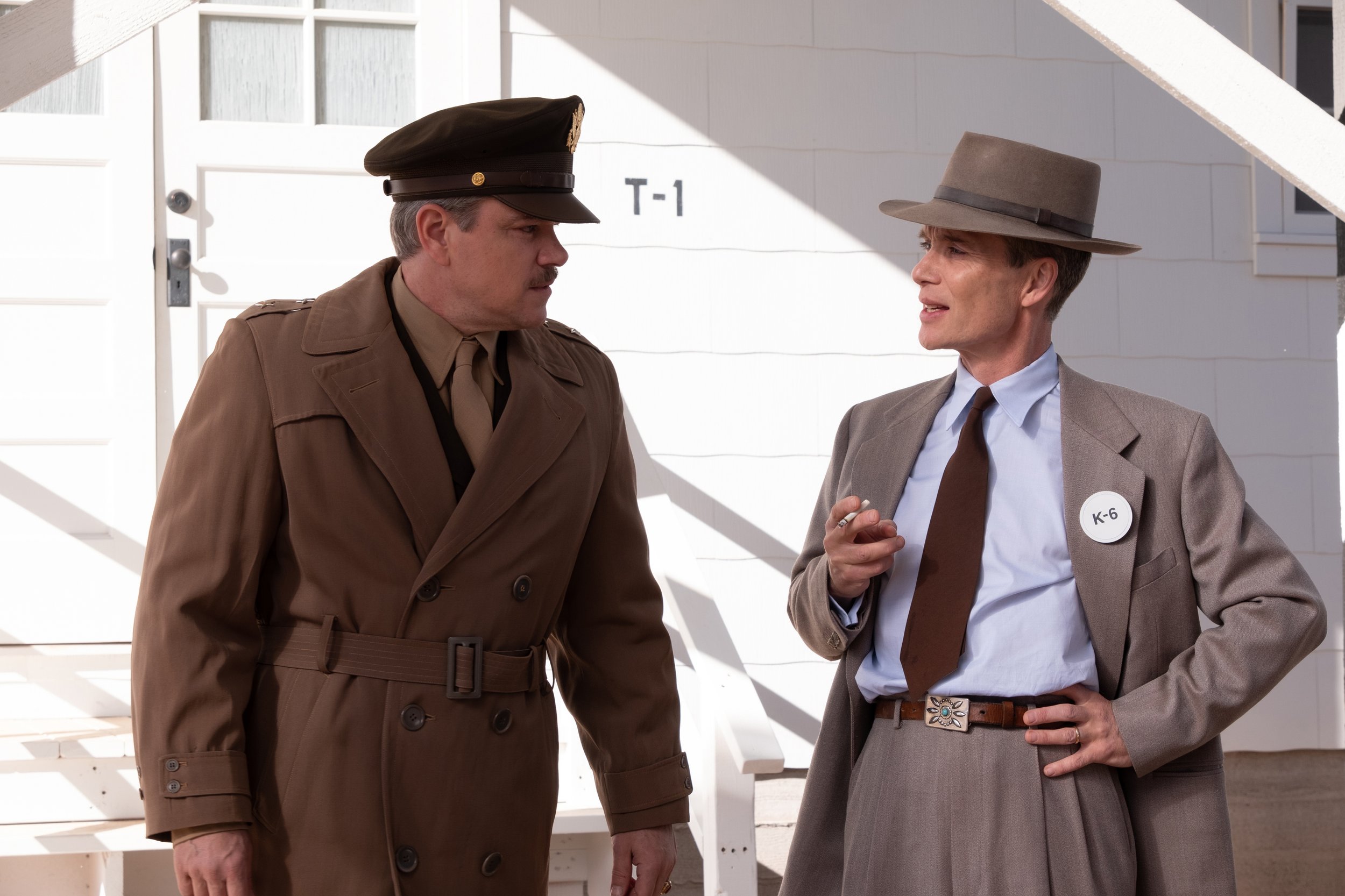Oppenheimer: The "Father of the A-Bomb" is Ready for His Extremely Long Close-Up
By Jim Slotek
Rating: B-plus
A common refrain from those who approach film-going a certain way is, “I don’t know who to like in this story.” We instinctively expect a good guy, a bad guy and a neat narrative.
Not surprisingly, Christopher Nolan puts us on a more challenging road in Oppenheimer, the story of the “Father of the A-bomb,” who became both a national hero and (during the Red Scare) a pariah, in the process of ending a war and regretfully igniting a generations-long nuclear arms race.
At three dense hours of mostly dialogue and murky motivation, Oppenheimer demands commitment and tests patience as we follow a brilliant but difficult-to-like protagonist (a mesmerizing Cillian Murphy).
Gen. Leslie Groves (Matt Damon) and Robert Oppenheimer (Cillian Murphy) talk fission in Los Alamos
By the time Gen. Leslie Groves (Matt Damon) puts J. Robert Oppenheimer in charge of the Manhattan Project, damning him personally as a “dilettante and a womanizer,” we already know this to be true. Murphy’s Oppenheimer is arrogant, often clueless about people, makes bad personal decisions, treats the women in his life badly and can be a hypocrite on moral grounds. (A leftist and self-proclaimed sympathizer for the common man, he objects to the marriage of a physicist and a waitress. I’m guessing he wouldn’t have been a fan of the sitcom The Big Bang Theory).
He also displays mentally questionable aberrant behavior, at one point leaving a poisoned apple for a professor who’d banned him from a lecture by Danish physicist Niels Bohr (Kenneth Branagh) for his poor lab work.
On the flip side, Oppenheimer’s prodigy status attracts the attention of men like Bohr, Albert Einstein (Tom Conti) and Werner Heisenberg (Matthias Schweighöfer), who propel his status. (Bohr sets him on a lifelong path by comparing quantum physics to music).
But as problematic a protagonist as Oppenheimer is, he is surrounded by arguably worse people of unclear motives and, in some cases, obvious malice. Oppenheimer opens with a post-war “trial” that is not a trial, a Senate committee looking at the man’s life and any excuse to deny his security clearance and effectively end his career.
The motivation: After Hiroshima and Nagasaki – which he didn’t object to before the fact – he became a proponent for peace and an opponent of the development of the “Super Bomb,” a.k.a. the H Bomb. H-bomb creator Edward Teller (Benny Safdie) is played here as a bitter, unprincipled, ambitious man, which is kinder than his public image as a Bond villain (Stanley Kubrick is said to have based the character of Dr. Strangelove on him).
Nolan doesn’t mess with our heads like he did in Tenet. His “time jumps” from the ‘30s to the ‘50s are of the traditional narrative kind, involving make-up, and in some cases, black-and-white scenes to give the latter a more Edward R. Murrow ‘50s news feel.
He picked the right actor to show in close-up for hours on end. Murphy’s face is both haunted and enigmatic. For a man who led the life he did, becoming the de facto mayor of the secret research town of Los Alamos, in charge of a $2 billion project (in ‘40s money), he is virtually never seen as happy.
And the star-laden cast is up to the task. Damon’s Gen. Groves is fully aware when he hires him that Oppenheimer has associated with Communists and leftists (including the love of his life, Jean Tatlock, played by Florence Pugh). He considers it insurance if he ever needs to pull the reins on his ego-driven physicist.
An almost-unrecognizable Robert Downey Jr.. plays the key character of Lewis Strauss, chair of the Atomic Energy Commission, who had been Oppenheimer’s early supporter, turned consumingly jealous antagonist. In a movie that seldom rises above a certain emotional level, Downey ultimately gets the big rage scenes.
Pugh and Emily Blunt (who plays Oppenheimer’s less-loved wife) don’t really get to carry much drama, but play their thankless roles with as much commitment as anyone else in the cast.
To be clear, Oppenheimer is three hours of testimony played out as drama. There are no action scenes as such, besides pyro played on the quantum and city-destroying level. It is the opposite of escapism, but it’s real history worth telling.
Oppenheimer. Written and directed by Christopher Nolan. Starring Cillian Murphy, Matt Damon and Robert Downey Jr. Opens in theatres Friday, July 21.



